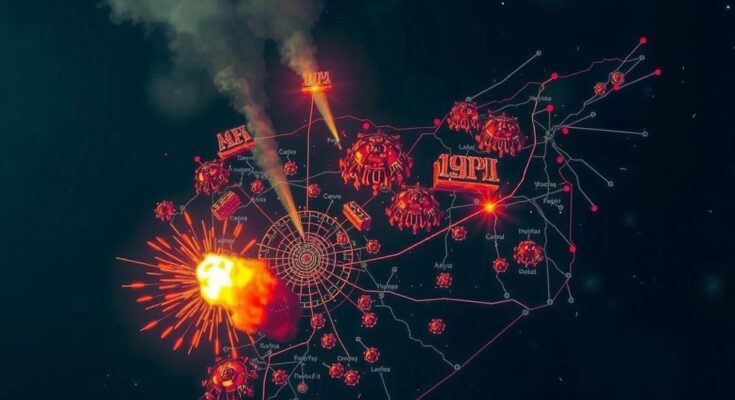Israel’s recent strikes against Hezbollah smuggling sites in Syria are testing a fragile ceasefire, which came into effect on November 27, 2024. Despite the initial lull in fighting, both sides continue to accuse each other of violating ceasefire terms. The strikes highlight the tenuous nature of peace amidst a backdrop of regional instability, with significant casualties reported on both sides throughout the conflict.
On Saturday, Israeli military aircraft targeted Hezbollah weapons smuggling locations along the border with Syria. This operation occurred shortly after a fragile ceasefire came into effect between Israel and Hezbollah, which had halted months of intense hostilities. The Israeli military justified the strikes as necessary, asserting that Hezbollah’s activities represented a violation of the ceasefire’s terms. Concurrently, as the ceasefire took hold, reports of sporadic gunfire persisted, indicating the tenuous nature of the truce.
The ceasefire, brokered by the United States and France, aimed for an initial two-month cessation of violence, urging Hezbollah to withdraw north of the Litani River in Lebanon, and requiring Israeli forces to retreat from the border region. Despite optimistic expectations following the agreement, both parties have accused each other of ceasefire violations in the days following the ceasefire’s initiation. With many displaced individuals returning to their homes, the overall atmosphere remained one of cautious tension rather than peace.
Israeli military statements noted operations against suspected violations and reported finding hidden weapons in a mosque. In this context, tensions heightened when an Israeli drone struck a vehicle in the village of Majdal Zoun, resulting in reported casualties. Overall, the volatile environment emphasizes the challenges of stabilizing peace amidst the ongoing conflict.
The conflict began when Hezbollah retaliated on October 8, 2023, in solidarity with Hamas, following a militant assault earlier in the month. Over the ensuing months, both sides inflicted significant casualties, with over 3,760 fatalities recorded in Lebanon, predominantly among civilians. Israel suffered losses as well, including civilian and military deaths.
As displaced Lebanese return from refuge amidst destruction, anxieties regarding potential escalations loom high. The situation is further exacerbated by regional instability, including recent clashes in Aleppo that heighten the area’s unpredictability.
The recent military activity by Israel targeting Hezbollah smuggling operations marks a significant event amidst a fragile ceasefire that aimed to restore stability after prolonged conflict. The ceasefire, effective on November 27, 2024, was negotiated by international powers and sought to lay the groundwork for a more extended period of peace, urging combatants to withdraw from key positions along the Lebanese border. However, the quick reiteration of hostilities highlights the difficulty in maintaining peace in a region characterized by deep-seated animosities and a history of violent confrontations. The undercurrents of the conflict can be traced back to the events of October 2023, when Hezbollah aligned with Hamas following an escalation in violence in Israel, leading to a prolonged cycle of attacks and retaliations. This context bears significance in understanding the present military actions and their implications for international diplomatic efforts aimed at mediating a durable settlement in the region.
The Israeli strikes on Hezbollah smuggling sites demonstrate the precariousness of the newly brokered ceasefire and the complexities of achieving lasting peace in a historically volatile region. Continuing allegations of ceasefire violations from both sides underscore the challenges of ensuring compliance with the terms of ceasefire agreements. Following months of intense conflict, citizens are returning to devastated areas, highlighting both a need for stability and the fear of renewed violence. As the situation in the Middle East continues to evolve, the international community’s role remains crucial in addressing ongoing tensions and facilitating peace.
Original Source: apnews.com




